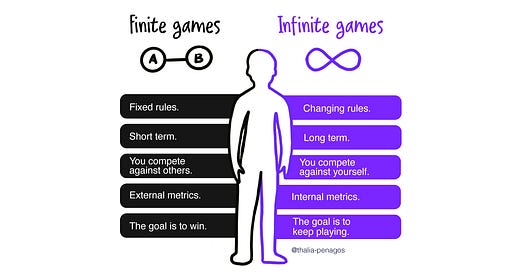For many, game theory might seem like the stuff of economists and mathematicians. However, it offers a crucial framework for understanding competitive strategy and leadership decisions.
In the changing world of business, where rules are ever-evolving and players come and go, it's pivotal for leaders to understand the strategy game that lays the foundation for sustained success. A powerful tool to elevate your leadership is understanding the basic precepts of game theory and the concepts of infinite and finite mindsets, coined by Simon Sinek. But what exactly are these, and why should you, as a leader, be tuned into them? Let's delve in.
Understanding the Game
Game theory, at its core, is a mathematical concept that explores how individuals make decisions in strategic situations. It is the study of how we strategize and make choices to compete or cooperate in various scenarios. In the business realm, it translates into understanding the dynamics between competitors, markets, and organizational strategies. (Simon Sinek)
"A finite game is played for the purpose of winning, an infinite game for the purpose of continuing the play."― James Carse, Finite and Infinite Games
The Finite and Infinite Mindsets
Intricately tied with game theory is the concept of finite and infinite mindsets. A finite mindset operates with a clear ending, guided by a win-lose perspective. It's the rush to be the best, often fueled by short-term achievements. In contrast, the infinite mindset focuses on the long game, a perspective that fosters innovation, encourages a strong organizational culture, and builds resilient teams capable of adapting to change. It's about playing to keep playing, a mindset that understands that in business, the game never ends.
As Simon Sinek points out in his discussion with Brené Brown, the infinite mindset can be a transformative tool for leaders. It nurtures a culture of adaptability and encourages leaders to focus on a just cause beyond profit margins.
Applying the Infinite Mindset in Business
So, how can you, as a leader, foster an infinite mindset? (Forbes)
Promote a just cause: Have a sense of purpose that goes beyond just making money or winning.
Build trusting teams: Create a supportive and collaborative work environment where everyone feels valued and respected.
Find worthy rivals: See other players in the game as collaborators rather than competitors and learn from their strengths and weaknesses.
Display existential flexibility: Be able to adapt to changing circumstances and challenges and make extreme strategic shifts when necessary.
Have a long-term mindset: Focus on sustainable growth and development over time, rather than short-term gains.
"Finite players play within boundaries; infinite players play with boundaries." ― James Carse, Finite and Infinite Games
Taking the First Step
Ready to change the game?
Adopting an infinite mindset isn't just a strategy; it's a philosophy, a new lens to envision leadership that stands resilient in the face of change, steering your organization towards a future prosperous with potential and boundless opportunities. Because in the grand scheme of things, it's not about winning the game; it's about advancing together, continuously evolving, and playing to forge a legacy that stands the test of time.
Have a story to share? I'd love to hear from you! If you're interested in learning more, feel free to contact me on LinkedIn.
Enjoyed this article? Follow me for more intriguing and relevant content 😉
Thanks for reading. See you next Monday.




